For many people, Amazon is the go-to place for almost everything under the sun. But is Amazon a good place to buy car parts, or should you stick with your dedicated auto parts store – whether online or off?
Here are a few common questions that come up when shopping for car parts on Amazon:
- Does Amazon have the right selection?
- Are the parts name brand? Do they include a warranty?
- Can you return the parts if they’re the wrong ones or defective?
- Are auto parts as good of a deal on Amazon as household goods?
In this guide, we answer those questions and cover the pros and cons of shopping for car parts on Amazon. We will share insight on how to avoid counterfeit parts, and provide three essential tips for successfully navigating Amazon’s massive website. We also make some price comparisons between Amazon and other popular retailers.
Why Choose Amazon For Car Parts?
In our previous article, Should You Buy Car Parts Online, we ended up getting a majority of what we needed on Amazon. While we visited several other online retailers, we decided on Amazon most of the time because of lower prices. Some of our comparisons below will show that Amazon is a price leader (most of the time).
The second reason to consider Amazon is fast delivery. Amazon profits fell 28 percent in 2019 because the company made investments to improve its delivery and logistic services. Amazon Prime members can often take advantage of same-day or overnight delivery, which is great if you’re in a hurry to fix that broken water pump.
But let’s dive a little deeper.
Buying Car Parts on Amazon: Pros
Selection
In early 2017, Amazon struck deals with a bevy of the largest auto parts suppliers in the U.S. to sell parts on its platform, meaning you should have plenty of selection.
While writing our original article, Should You Buy Car Parts Online, the thing that struck us most was the variety on Amazon. Parts are available for both old and new cars, a trait that rivals most brick-and-mortar parts stores. If you have a one-off project car or an old classic where parts are hard to come by, you will likely have luck on Amazon, although admittedly not as much as specialized stores.
Price
With Amazon’s wide selection of car parts, having the ability to compare prices is very useful. Amazon makes comparing prices relatively easy, which is something we take advantage of when shopping for parts. Although there is one caveat. The good deals on Amazon depend more on what car parts you’re buying versus them having the lowest price across the board.
Amazon’s pricing strategy is unique, to say the least. The platform identifies the most popular products based on customer demand and lowers the price dynamically – in most cases, way lower than the competition. Then they hike up the price of not-so-popular products or products you’re less likely to price compare, which is where they recoup any losses and increase profit.
Seasonal demands play a role too. Just because the price on Amazon is good today, doesn’t mean it will be tomorrow. We noticed this when we bought a K&N intake kit for our Honda S2000. Here is a screenshot:
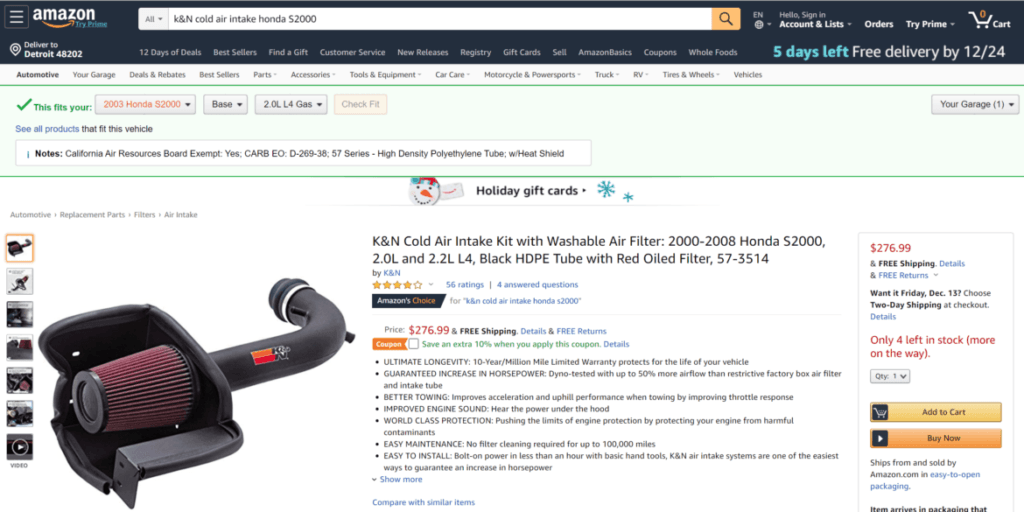
Back in December, the air intake kit was around $73 less (with the extra 10% instant discount) than when we actually bought it in January. We think the discounted price was meant to entice buyers since it was December, and the holidays were right around the corner.
The above screenshot is from December ($276.99 + 10% off), while the one below is from right after the holiday shopping rush ended ($322.65). Although you often find lower prices for auto parts on Amazon, some of the traditional, seasonal rules of retail still apply.
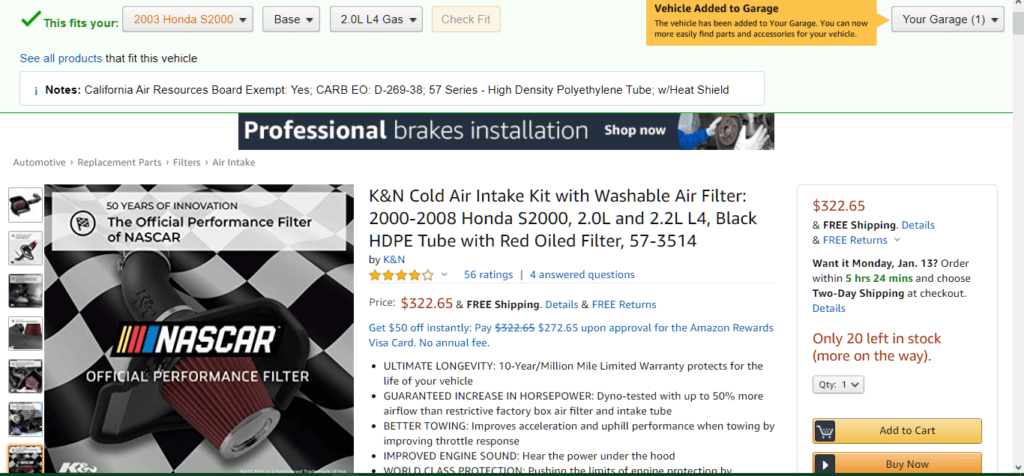
In hindsight, we should have purchased our K&N intake kit in December and saved the money.
Buying Car Parts on Amazon: Cons
Only Photos to Guide You
There’s no way to physically inspect the part before ordering, which might make some nervous about shopping online in the first place. For some, there is no substitute for being able to touch the part before you buy it.
“My stepdad was that way,” recalled Carl Anthony, Automoblog’s Managing Editor. “He was a farmer in northwest Iowa for years and fixed everything on his machinery or pickup himself. There was no internet or smartphones back then. And he was adamant that, no matter what you buy, you always take it out of the box and inspect it.”
In some cases, the actual serial number of the part will be indicated by the seller in the product description. Make sure, if you are shopping on Amazon, you always double-check the serial numbers. And if high-resolution images are available – and most of the time they are – you can zoom in for a closer virtual inspection.
Counterfeit Parts Are a Lucrative Business
Fake auto parts have become a global concern now that online e-commerce platforms like Amazon have grown into what they are. Although we have never personally encountered counterfeit parts on Amazon, it’s something all shoppers need to be cautious of, because it does happen.
“Fake automotive components are a highly lucrative business for counterfeiters,” said Sophie Peresson, Director of the Business Action to Stop Counterfeiting and Piracy, or BASCAP. “The amount of fake parts being made and distributed continues to rise despite efforts by national governments.”
According to BASCAP, the negative impacts of counterfeiting and piracy are projected to drain $4.2 trillion from the global economy and put 5.4 million legitimate jobs at risk by 2022. The market for fake parts will soon be worth more than the annual GDP of Italy or Brazil by 2022. In Europe alone, it is estimated that up to €2.2 billion is lost each year on counterfeit tires.
“Our goal is not to scare anybody here, but these are the facts based on credible bodies of research,” Anthony said. “We don’t want our readers buying a part that could potentially reduce the safety of their vehicle.”
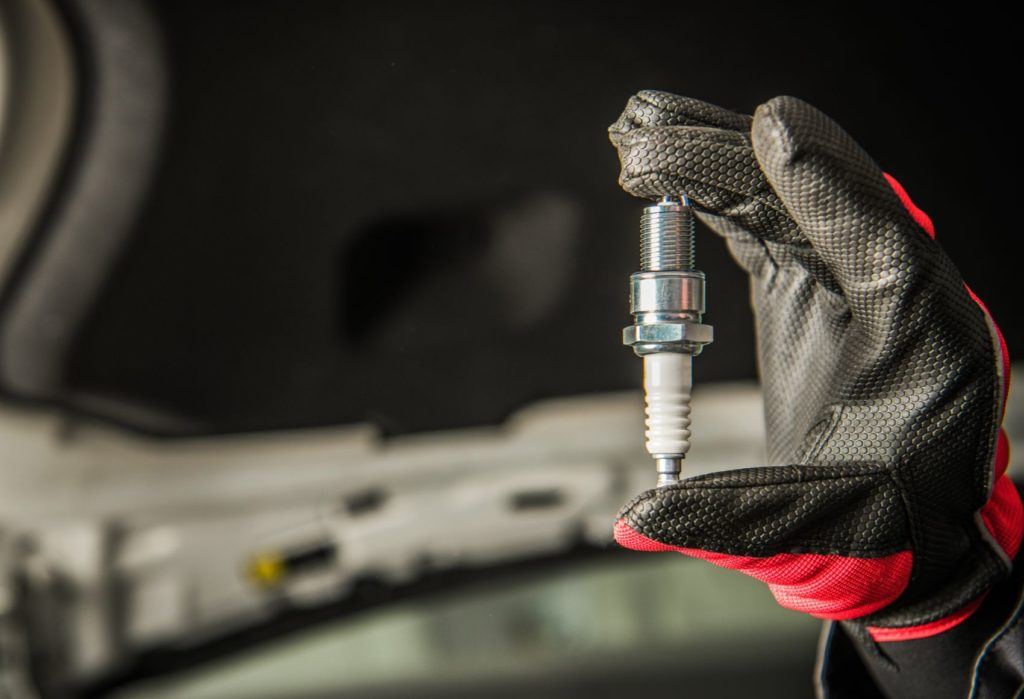
Fake Parts: How to Protect Yourself
First, some good news: Amazon is also making significant investments in automated machine learning systems to curb the proliferation of fake parts on its platform. Still, here are some tips to help you avoid buying fake, counterfeit, or imitation car parts online.
Tip 1: It’s All About The Seller
When shopping on Amazon, it’s easy to assume you’re buying directly from the actual company or brand that makes the part, but this usually isn’t the case. Most of the time, you’re buying from third-party sellers or authorized retailers, which is fine.
Even though buying directly from the manufacturer is the best way to avoid piracy, you should click on the seller’s name and read the feedback from previous buyers. It’s important to know who you’re buying from; multiple sellers are often selling the same product.
Tip 2: Read Customer Reviews
Customer reviews are an easy way to spot a fake part or a bad seller. Only buy from sellers with good reviews (over a 4-star rating.) If you bought a car part and weren’t satisfied with the quality or packaging, you should contribute to the online community by leaving your own review.
And if you were pleased with your purchase, leaving a positive review will help the honest seller and other shoppers. And remember, there’s a difference between product reviews and seller reviews.
Tip 3: Check The Packaging
Granted, you can only check the packaging once the product arrives, but poor packaging or an opened package are considered red flags. If the product is legit, it should come with certifications and/or a warranty inside the box. With some parts, you can verify its authenticity by checking the serial or part number through the manufacturer’s website.
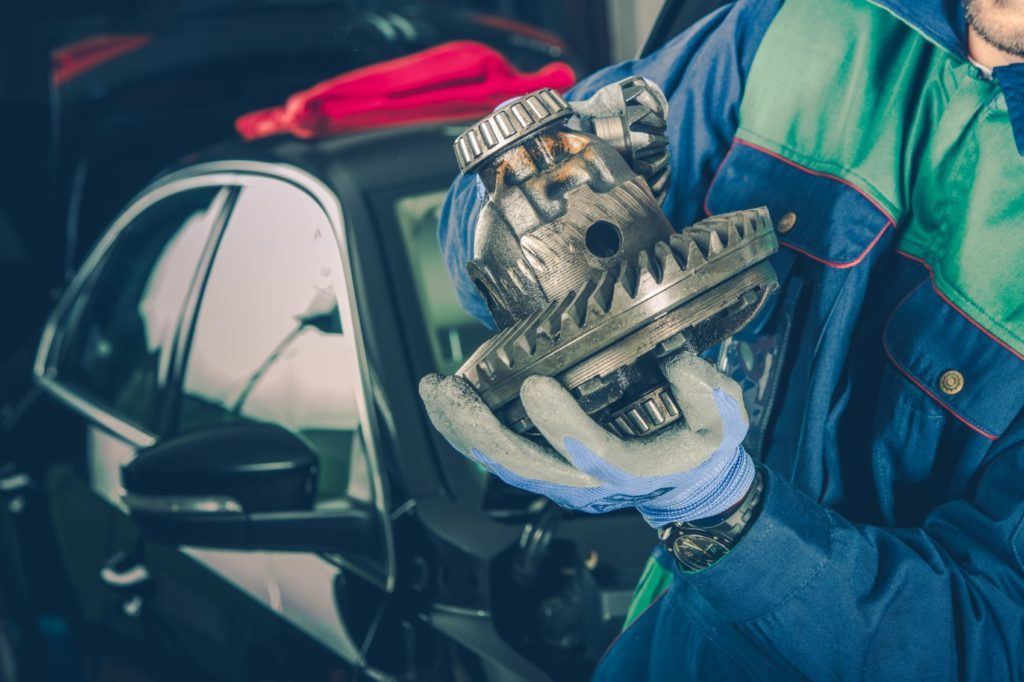
Can I Return a Bad or Wrong Part to Amazon?
There’s an old article about the quirks of buying on Amazon. This was many years ago, but it has something to do with a DOHC long-tube header which ended up being the wrong one. After initiating the return process with Amazon, the writer of the article found out the seller was not Amazon. Turns out, the headers were sold by a company called OBX, which is based in China.
Long story short, he resorted to selling the wrong part via forums online, where he found out the same part can be bought from another importer at almost half the price.
With genuine parts from legitimate and reputable sellers, you should be okay if you need to return a bad one. Amazon says this on the returns section of their website: If you’ve purchased a defective automotive item, shipped from and sold by Amazon.com, that is covered by a published manufacturer warranty, Amazon honors the warranty. Amazon will either replace the item or refund the cost of the item for the life of the published warranty.
To help avoid a possible return, double-check to make sure the part you’re buying is the one you actually need. Even though you can almost always return the part, it’s still a hassle. Below we share three tips to ensure you are getting the right part, each and every time.
3 Quick Tips For Navigating Amazon
Tip #1: Filter According to Your Needs
Amazon is home to a vast array of car parts, so it can be hard to know where to start. We always go right to the Your Garage section. It’s nothing more than entering the make, model, and trim of your vehicle. If you do this, Amazon will only show the parts that are an exact fit for your car.
Tip #2: Take Your Time
As you search for car parts – let’s say, a set of lowering springs for a Honda Civic – Amazon will present multiple pages of lowering springs from different brands, sellers, resellers, and retailers. When you find what you’re looking for, take a minute or two to read the product descriptions.
Here’s a hint: comprehensive descriptions (complete with high-resolution images, videos, installation manuals, etc.) are usually created by legit sellers with favorable ratings. Take a moment to go through these additional resources before buying anything so you know what you’re getting.
Tip #3: Let The Reviews Guide You
We mentioned this already, but we cannot stress this enough. It’s essential to look at the reviews when buying car parts on Amazon (and this holds true for everything you buy on Amazon). Sellers with a 5-star rating are the preferred choice, and products with favorable reviews are a huge plus. Make it a habit to check those before shopping on Amazon. Only buy from sellers with high ratings and good reviews.
With all that in mind, let’s make some price comparisons.
Amazon vs. Online Stores: Which Offers Lower Prices?
Price Comparison #1
We got the ball rolling by searching for a new air filter for our trusted 2015 Honda Civic EX-L. We went to Amazon and found a Spearhead Max Thrust performance air filter for less than $13.
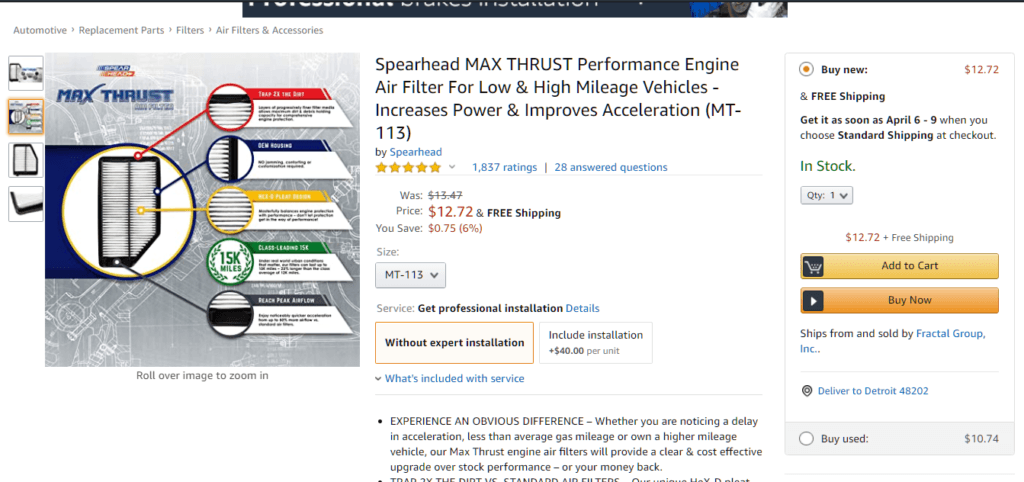
The product has a 5-star rating with 1,837 customer reviews. Max Thrust air filters are known for having the same level of quality (if not better) than OEM and other aftermarket air filters.
Before we made a decision, we went to Advance Auto Parts and found a Carquest Premium air filter for less than $20.
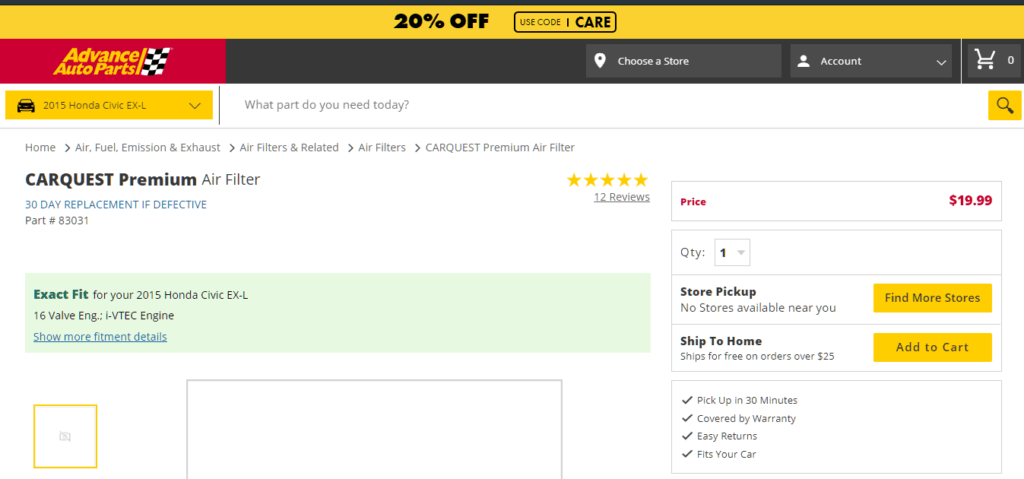
Next, we went to O’Reilly’s and was offered a choice between two brands of air filters with different prices.
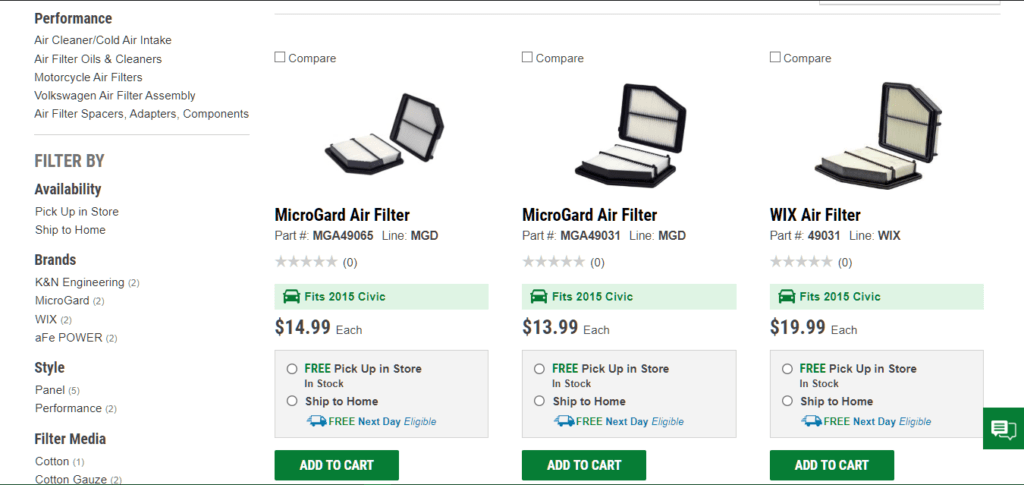
In this comparison, our order goes to Amazon based on price and quality.
Price Comparison #2
Our trusted Civic also needed a pair of rear sway bar links. We first went to AutoZone and found a Duralast sway bar link for $26.99.
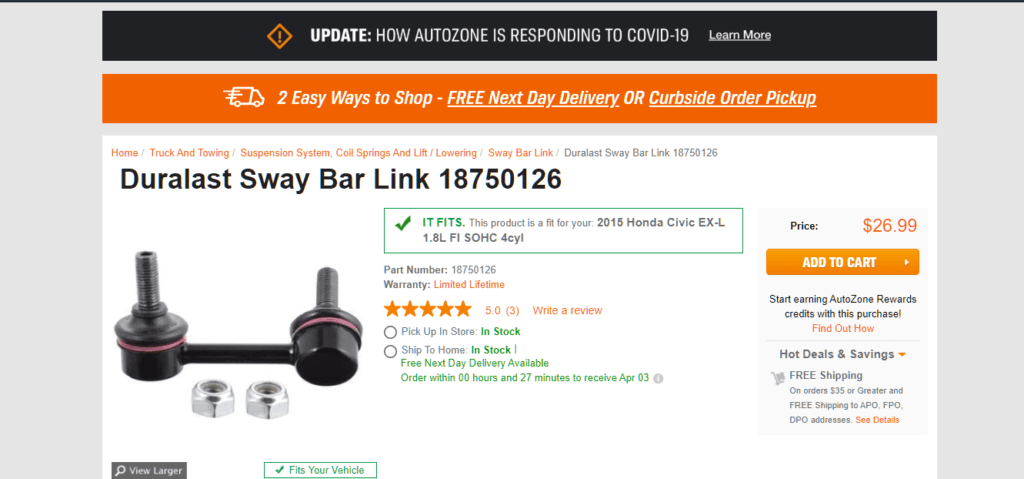
However, the product is sold per piece. And since we needed a pair of links, we’ll end up paying around $55 if we go with AutoZone.
This prompted us to search on Amazon for the same part, and here’s what we found:
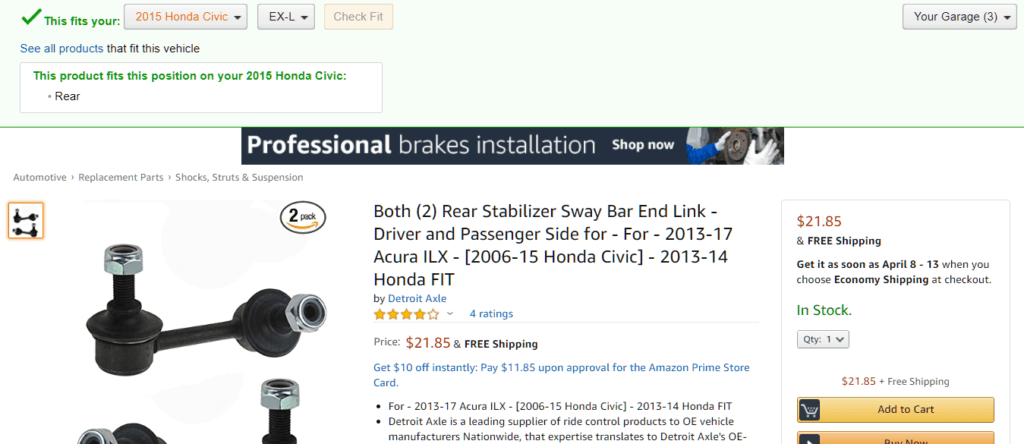
We found a pair of rear sway bar links for less than $22. The product comes with free shipping and is sold by Detroit Axle, a manufacturer and distributor of OEM and replacement parts in Ferndale, Michigan.
But we didn’t press the Add to Cart button yet. We went to O’Reilly’s and found a Beck/Arnley stabilizer end link selling for $28.99 each.
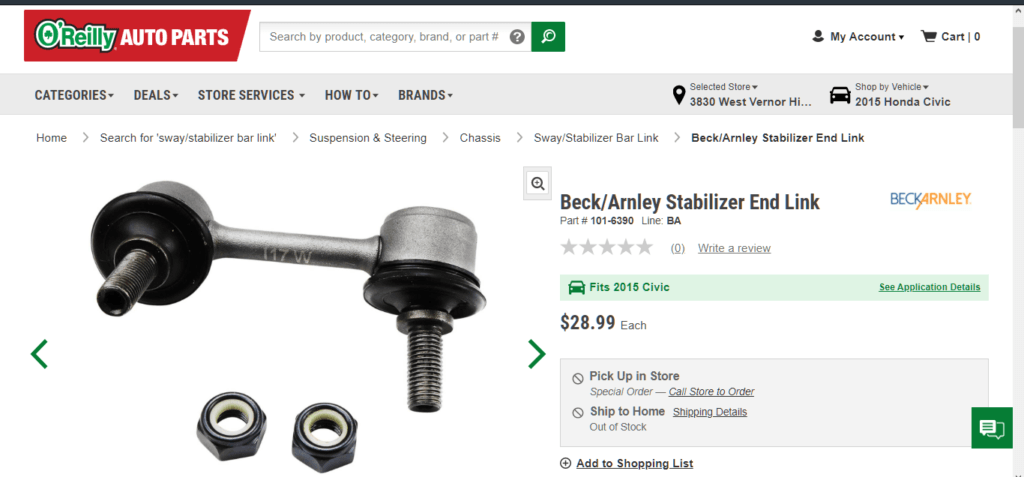
In this round, we ended up buying from Amazon since it offered the best bang for the buck by far.
Price Comparison #3
We were also in the market for a set of front brake pads and rotors. In this round, we decided to forego physical stores with an online presence and went straight to purely online auto parts stores. We compared Amazon, CARiD, and PartsGeek.
First, here’s what we found on Amazon:
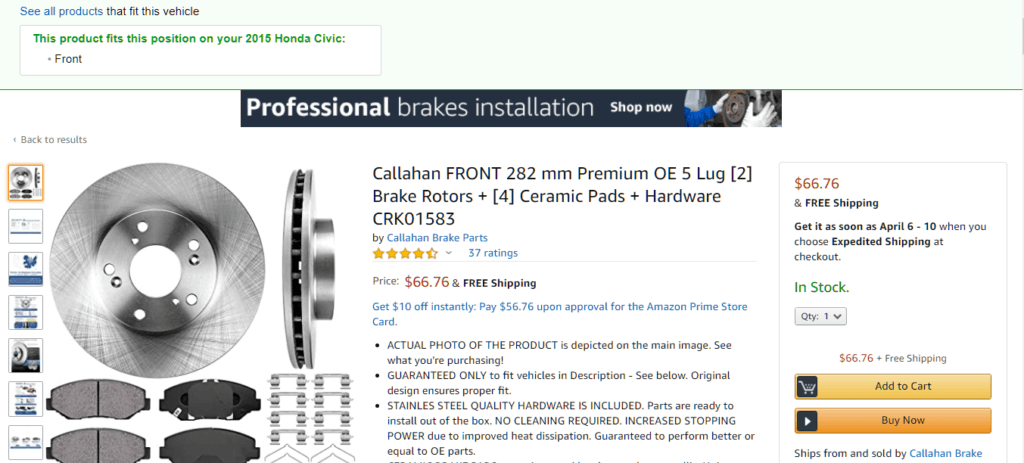
Amazon is peddling a set of Callahan front brake rotors with ceramic pads for less than $67 with good reviews. Not bad, but we sensed a better deal elsewhere.
Next, we went to CARiD and found a Centric front brake kit for $91.45.
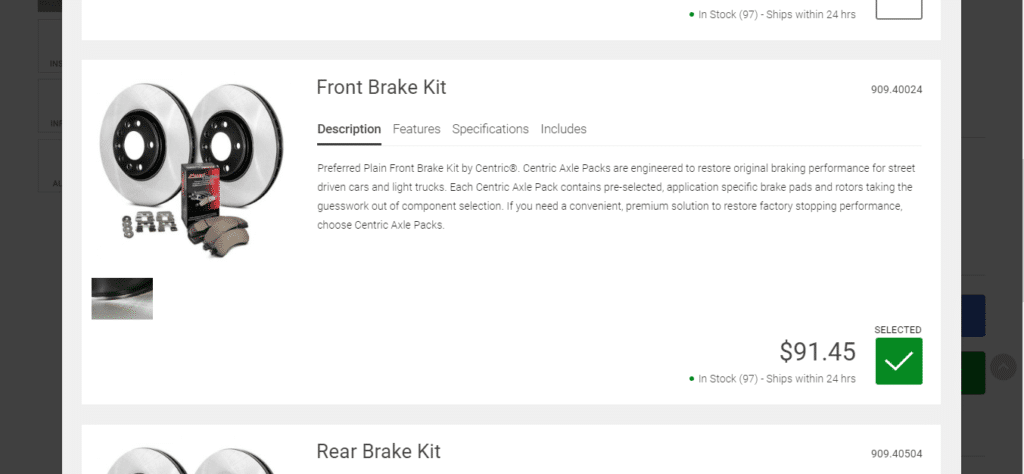
We gave it another shot and found a more affordable set from the same brand.
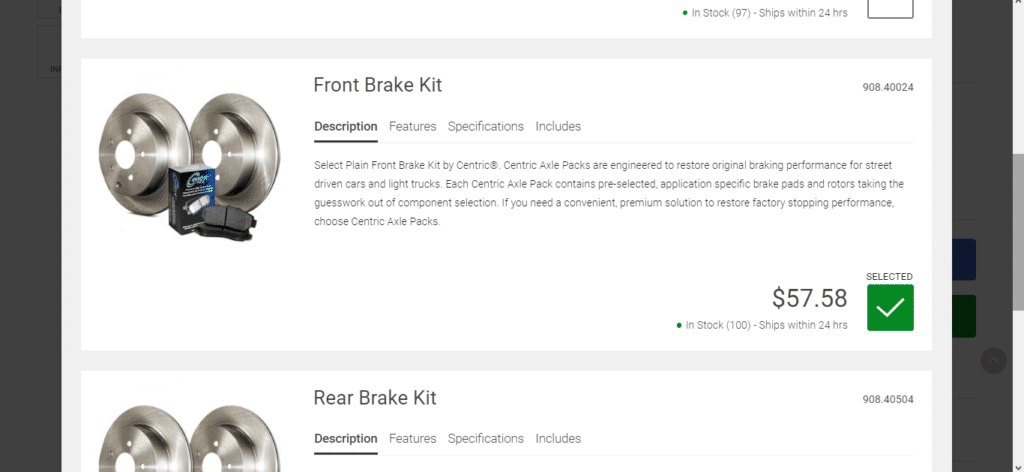
Now that’s better! But there’s a catch: The Callahan kit from Amazon came with ceramic brake pads while the Centric kit from CARiD has semi-metallic pads. Experience tells us that ceramic-infused brake pads are quieter (or less squeaky, if you will) than metallic or semi-metallic pads.
We can go either way here, but we decided to keep shopping and visited PartsGeek. We found this:
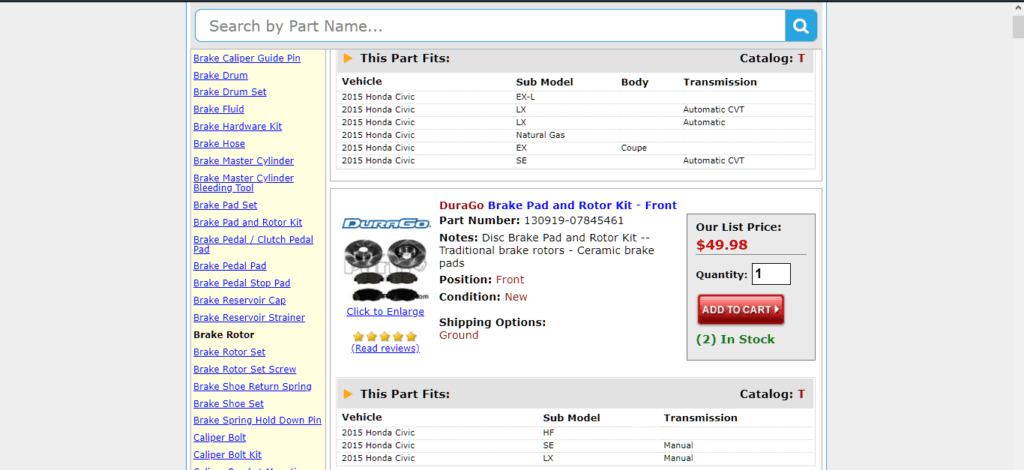
PartsGeek had a set of DuraGo front rotors and pads for less than $50. This is phenomenal if you’re working with a tight budget. But the thing that stood out is the ceramic brake pads included in the kit.
For the first time in our test, Amazon came in third place as CARiD and PartsGeek had a more extensive selection of brake kits for less.
Price Comparison #4
We also have an ailing 2007 Toyota Corolla in our fleet. It had a check engine light and P0301 error code along with misfires and rough idling. After an hour of tinkering around, we traced the problem to a bad ignition coil. We went to Amazon to search for an OEM ignition coil and found this:
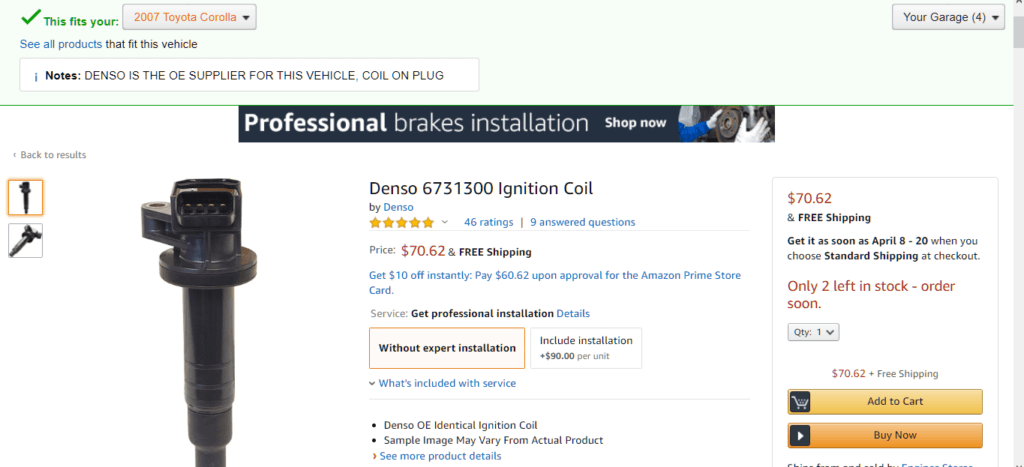
Truth be told, we never thought an OEM ignition coil would cost upwards of $70, but that’s what we found. Notice the 5-star rating? We know that original/OEM coil packs can last for 100,000 miles before encountering problems. Still, we decided to look elsewhere in search of a better deal.
Next, we went to RockAuto and found the same OEM coil pack from Denso along with a bevy of lower-priced replacement coil packs.
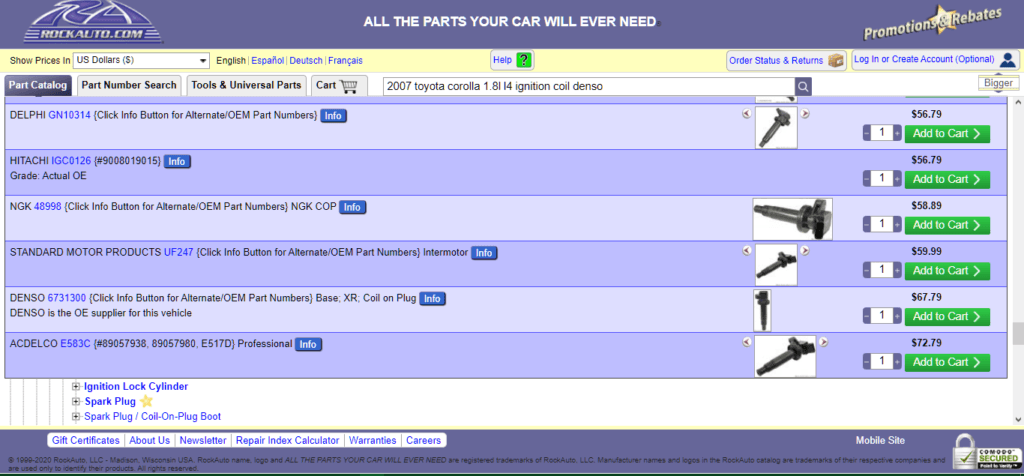
We’re pining for Denso, so we took a closer look.
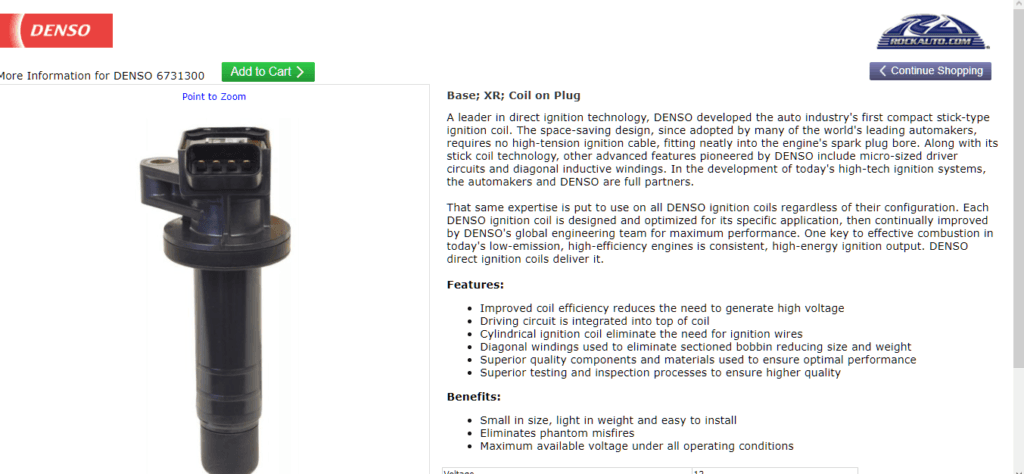
It’s the same Denso coil pack selling for around $68 – just $2 less than what Amazon is offering.
We weren’t convinced, so we went to PartsGeek and found this.
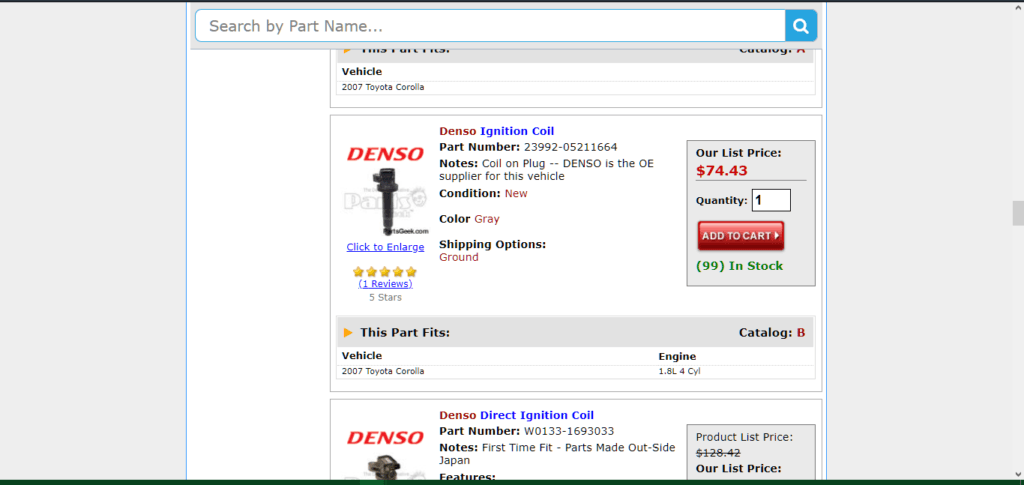
We weren’t expecting this, but Amazon is offering a better deal than PartsGeek. And even though we bought the part from RockAuto (a penny saved is a penny earned), Amazon has proven itself worthy of consideration when buying car parts online.
So Should You Buy Car Parts on Amazon?
Amazon’s selection of auto parts has improved drastically over the past few years, and now you can find just about everything you want in their Automotive section. When it comes to buying replacement parts and accessories, it’s one of the first places we look. But there are a few things to keep in mind before hitting the Add to Cart button:
- Always check the product reviews to make sure you’re getting a good part.
- Always check the seller reviews to make sure you’re buying from a trustworthy seller.
- Make sure to comparison shop with other online stores (we listed some below).
Additionally, when it comes to specialized and performance parts, you might be better off shopping at dedicated stores who really know your particular car. But if you know what you’re looking for, Amazon can be a great place to find parts and save some money.
Where Else to Shop For Car Parts Online?
Keep in mind that Amazon isn’t the only place to buy high-quality and affordable car parts online, as proven by our experience. Here’s a shortlist of online retailers we can vouch for, in alphabetical order. We separated them by online-only stores and stores that also have a physical location in case you prefer to go pick up your parts in person:
Online-Only
Physical Stores Too
- Advance Auto Parts – get 15% off with code AAP15OFF
- AutoZone
- NAPA
- O’Reilly
- Pep Boys
Original article: Should You Buy Car Parts on Amazon? We Did The Research to Find Out
from Automoblog https://ift.tt/2MEWHNp
No comments:
Post a Comment